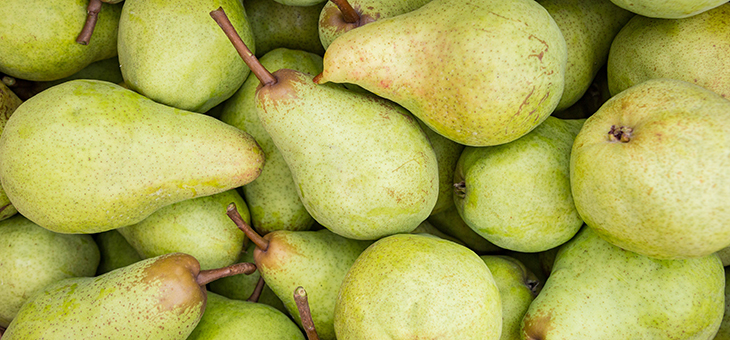Pears are from the Rosaceae family, arguably one of the six most economically important crop plant families. The rose family also includes apples, quinces, almonds, peaches, apricots, plums, and many more. The pear, a close cousin of household staple the apple, is an ancient fruit with references in Greek mythology. They were one of the first fruits to be cultivated in Britain and were grown in Australia upon the arrival of the First Fleet.
The two main types of pears you’ve probably come across are European and Asian pears. It’s thought that both developed over similar timelines, but in different parts of the world.
European pears tend to have a longer neck and are usually soft fleshed and mildly sweet, whereas Asian pears are more rounded in shape, with a crunchier texture and a hint of tartness. As they have different cell structures, they can sometimes have a slightly gritty texture compared to European pears. Prickly pears, also a fruit, are unrelated, belonging instead to the cactus family.
Growing and picking
Pears in Australia are mostly grown in Victoria and South Australia and, although the picking season can start as early as January, are at their best in autumn and winter.
European pears, interestingly, ripen from the inside out making them one of the few fruits that are actually better picked when still hard. The best way to know if a pear is ripe is to gently press the fruit just below the stem: a little give indicates its readiness.
How to buy, store and use
Buying Choose pears that are unblemished and still firm. Look for those that are brightly coloured and fragrant, and avoid blemishes or soft spots.
Storing Allow pears to ripen for three to five days at room temperature. Once ripe they can be kept in the refrigerator for up to four days.
Preparing Pears can be eaten raw, with or without the skin. They can also be baked or poached for a naturally sweet dessert.
Here, Lily Soutter, a leading London nutritionist, reveals some of the great health benefits of pears.
1. They are great for digestion
Pears contain high levels of dietary fibre – as much as 6g in one medium-sized fruit. “Consumption of dietary fibre is key for digestive health and preventing constipation,” says Ms Soutter. “What’s more, a raw pear is 84 per cent water, so if you struggle to stay hydrated throughout the day, this tasty snack can be a way of increasing your water intake.”
2. They can help with weight management
While the calorie content of some fruits – such as dates and avocados – can put some people off, there is no such issue with pears.
“Not only do pears taste great, but they are a perfect low-calorie addition to [any] diet when losing weight,” says Ms Soutter, plus, “their high-fibre content means that this delicious, sweet snack is great for keeping hunger at bay.”
3. They may help prevent cancer
“Pears are a great source of antioxidants and polyphenols, including flavanols. They are also a source of the antioxidant nutrient vitamin C,” says Ms Soutter.
She adds that, while more research is needed, some evidence suggests a diet high in antioxidant-rich fruit and vegetables may have anti-cancer benefits.
4. They help balance blood sugar
The sweetness of pears has added benefits to the body, according to Ms Soutter.
“Pears provide a proportion of their sugar as fructose. Interestingly, fructose-rich foods do not raise blood sugar levels as rapidly as glucose.
“This means that pears are the perfect sweet snack for balancing blood sugar.” Ms Soutter explains that they also minimise the risk of a blood sugar crash, which often comes with the consumption of high-sugar foods such as sweets and biscuits.
“What’s more, the high-fibre content of pears ensures that a slow and sustained release of sugar is provided to the body and brain,” she adds.
5. They provide key minerals
Hidden in pears are traces of substances you might not expect, but are key for the body’s wellbeing. “Pears provide a source of potassium, magnesium and iron,” says Ms Soutter. “A diet full of fruit and vegetables provide these minerals, which play a role in maintaining healthy blood pressure, while iron is important for red blood cell formation.”
Move over apples: When it comes to overall health, a pear a day may just keep the doctor away, too, thanks to their impressive vitamin and mineral content.
Are you a pear fan? What’s your favourite way to eat them?
– With PA
If you enjoy our content, don’t keep it to yourself. Share our free eNews with your friends and encourage them to sign up.
Related articles:
https://www.yourlifechoices.com.au/food-recipes/recipes/pear-sage-and-hazelnut-bread
https://www.yourlifechoices.com.au/food-recipes/recipes/baked-pears-and-caramel-sauce
https://www.yourlifechoices.com.au/food-recipes/recipes/rhubarb-and-walnut-muffins

